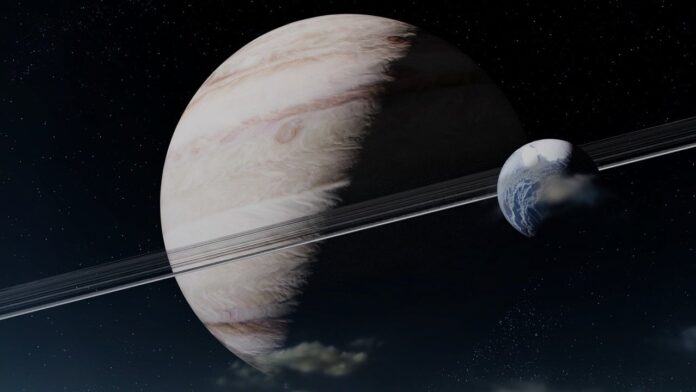Saturn’s largest moon, Titan, has been a topic of intrigue among scientists due to its unique characteristics. This natural satellite, larger than the planet Mercury, is the only extraterrestrial body known to sustain liquid on its surface. These are not bodies of water, as we know on Earth, but seas of liquid hydrocarbons, primarily methane.
The ‘Magic Islands’ Phenomenon
In the midst of these alien seas, a peculiar phenomenon caught the attention of scientists – the appearance of transient bright spots, termed as ‘magic islands’. These anomalies, first detected by NASA’s Cassini spacecraft in 2014, appear and disappear on the surface of Titan’s seas, lasting anywhere from a few hours to several weeks.
Theories About Magic Islands
Several hypotheses have been proposed to explain these ‘magic islands’. Initial suggestions were that they could be waves, nitrogen gas bubbles, or solids (either suspended or floating) on the surface. However, the wave theory was largely dismissed as the seas of Titan are peculiarly smooth with waves only a millimeter tall at most.
The Organic Compounds Theory
A new perspective on this enigma focuses on the interaction between the formation of solids in Titan’s atmosphere and their behavior once they reach Titan’s lakes. Titan’s dense atmosphere is rich in organic molecules which, under certain conditions, clump together, freeze, and fall onto the moon’s surface. This leads to the question – could these solid organic compounds be the ‘magic islands’?
Investigating the Floating Organics Hypothesis
The theory that the ‘magic islands’ could be organics floating on the surface was investigated by a team of researchers led by Xinting Yu from the University of Texas. They found that the lakes of Titan are already saturated with organic particles, which implies that the falling solids would not dissolve upon reaching the liquid.
The Porosity Factor
The surface tension of the lakes, primarily composed of methane and ethane, is low, making it difficult for solids to float. The researchers suggested that the only way these solids could float and form the ‘magic islands’ would be if they were porous, similar to pumice stone on Earth. This porosity would allow methane to seep in slowly, enabling these solids to float on Titan’s seas.
The Formation of ‘Magic Islands’
According to the model proposed by the researchers, the ‘magic islands’ would not form in the middle of the lakes, but by the shores. Here, the porous solids could accumulate to a significant size before breaking off and floating away. This theory not only explains the formation of ‘magic islands’ but also the unusually smooth nature of Titan’s seas, which could be due to a frozen solid coating on their surface.
The Bubbles Theory
An alternative theory proposed by researchers from the University of Reims in France suggests that the ‘magic islands’ could be large bubbles fizzing up from the depths of Titan’s seas. They theorize that the mix of nitrogen, ethane, and methane in these seas might become unstable under certain conditions, causing nitrogen bubbles to rise to the surface. These bubbles are highly reflective to radio waves, making them appear as bright spots in radar scans.
Implications for Future Explorations
These findings have significant implications for future explorations of Titan’s seas. Any missions planning to deploy submarines in these seas would need to take into account the possible instabilities of the liquid at the sea bottom, caused either by floating organic solids or rising nitrogen bubbles.
While the exact nature of Titan’s ‘magic islands’ is yet to be definitively determined, the research conducted so far provides fascinating insights into the unique conditions and phenomena of this alien moon. As we continue to explore and understand these distant celestial bodies, we unravel the mysteries of our solar system, bringing us one step closer to comprehending the vast expanse of the universe.
